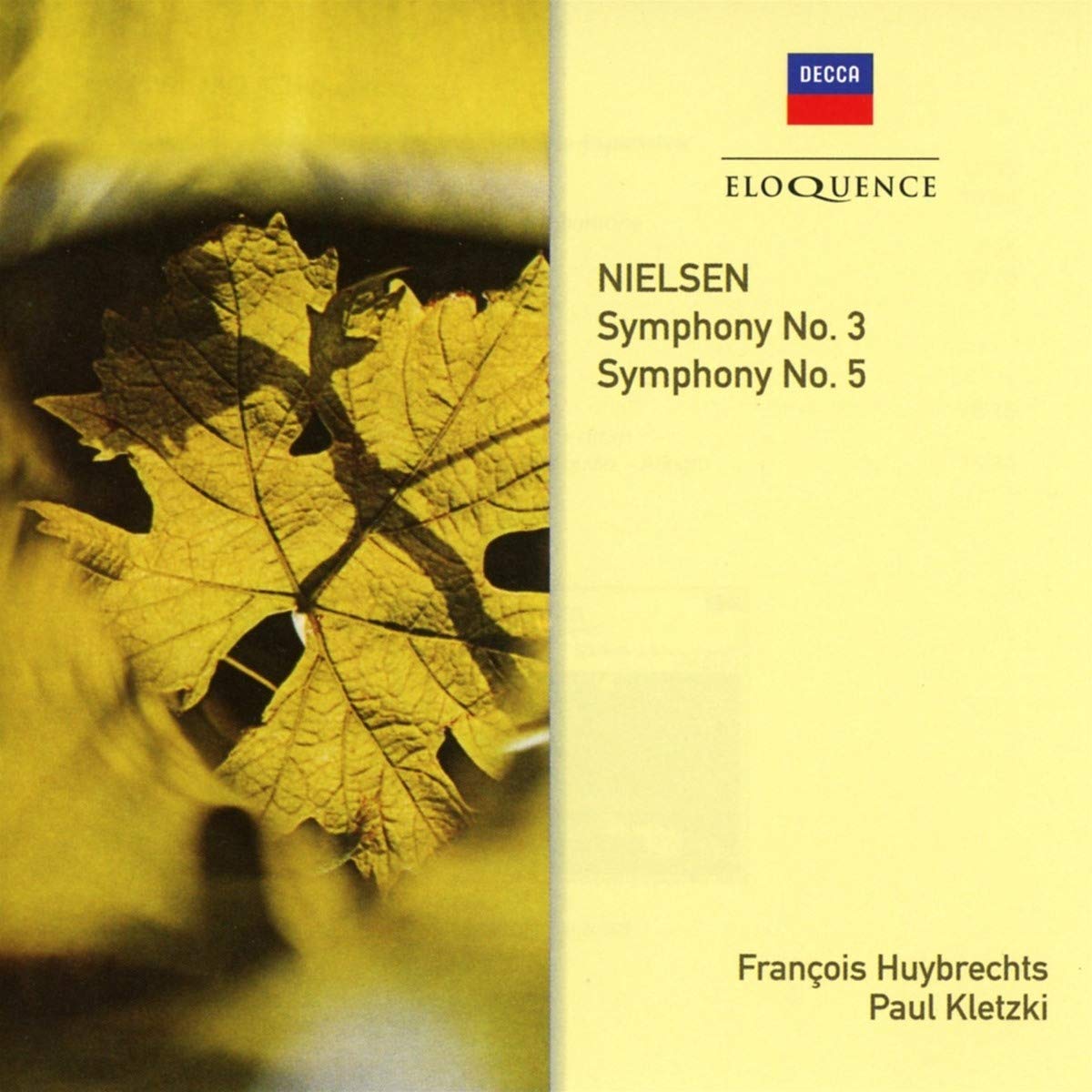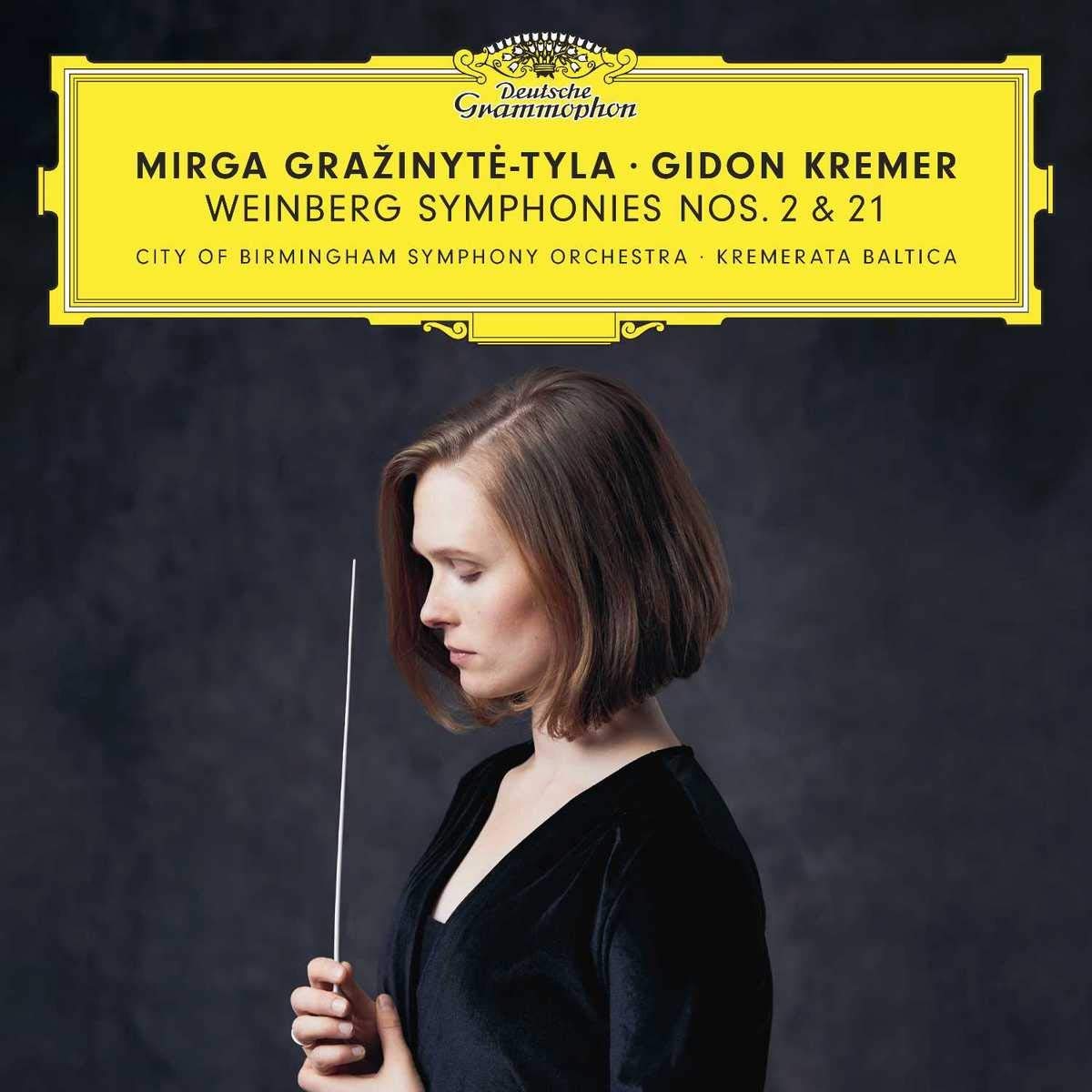Classical CDs Weekly: Stewart Goodyear, Nielsen, Weinberg | reviews, news & interviews
Classical CDs Weekly: Stewart Goodyear, Nielsen, Weinberg
Classical CDs Weekly: Stewart Goodyear, Nielsen, Weinberg
Cross-cultural pianism, analogue treasures from the Decca vault, and a powerful Russian symphony

 Stewart Goodyear: Callaloo, Piano Sonata; Gershwin: Rhapsody in Blue Stewart Goodyear (piano), Chineke! Orchestra/Wayne Marshall (Orchid Classics)
Stewart Goodyear: Callaloo, Piano Sonata; Gershwin: Rhapsody in Blue Stewart Goodyear (piano), Chineke! Orchestra/Wayne Marshall (Orchid Classics)
Callaloo is Stewart Goodyear’s indecently entertaining suite for piano and orchestra, the title referring to a mixture of diverse elements. Goodyear alludes to having grown up in a polyglot, multicultural Toronto, also taking inspiration here from his Trinidadian heritage. Specifically a recent encounter with the country's Carnival tradition (“I was exposed to Calypso music for two weeks straight, riveted every second”). Visceral excitement aside, you're won over by how seamlessly Goodyear integrates sophisticated classical elements into the music. Think late Gershwin. Driving string ostinati push “Mento” forward, and there's more rhythmic fun to be had in a very mellow middle movement. Best is the effervescent closer, “Soca”, music which deserves a Proms outing. You're left marvelling at exactly how Goodyear managed to actually notate this stuff, and at the insouciant virtuosity with which he and Wayne Marshall’s Chineke! Orchestra attack the music. Anyone in need of an energy boost need look no further. Goodyear’s youthful Piano Sonata is a precocious attempt “to pull out the stops and create the most difficult piano work ever composed”. As with Callaloo, there's a brilliant mingling of serious and popular elements, the music’s technical difficulties never getting in the way of the fun.
Gershwin’s Rhapsody in Blue makes for a neat closer. Goodyear suggests that this work is another callaloo, fusing 1920s popular music with klezmer and blues. Sensibly, he and Marshall opt for the original jazz band version in one of the most enjoyable modern accounts I've heard. Fast, ferocious and brilliantly characterised, the big tune’s reprise is totally free of bombast. An enjoyable collection.
 Nielsen: Symphonies 3 & 5 London Symphony Orchestra/François Huybrechts, L’Orchestre de la Suisse Romande/Paul Kletzki (Decca Eloquence)
Nielsen: Symphonies 3 & 5 London Symphony Orchestra/François Huybrechts, L’Orchestre de la Suisse Romande/Paul Kletzki (Decca Eloquence)
Nielsen's symphonies are almost standard repertoire now, but this disc take us back to a time when they were real rarities. I can dimly remember spotting Paul Kletzki’s Nielsen 5 LP in a charity shop years ago, kicking myself ever since for not having bought it. Several decades on, it's a joy to finally hear the performance, Kletzki having succeeded Ernest Ansermet at the helm of the Orchestre de la Suisse Romande in 1967. That the players sound so at ease with the work is testament to Kletzki's skills as an orchestral trainer: this is a thoughtful, very exciting performance. Very Gallic-sounding bassoons at the symphony's start signal that we're in for something special; Decca's spectacular sound adds to the impact. I've heard crazier snare drum cadenzas, but the sense of relief when it's vanquished is glorious, Kletzki's principal clarinet unmatched at the movement's close. Nielsen's dizzying finale stretches these players to the limit, Kletzki’s swiftish tempi making the closing pages overwhelming. This is one of the great symphonic endings, all the better for Nielsen's refusal to wallow in the music’s triumph. Kletzki does it justice.
The coupling is rarer still, one of a handful of recordings made by the Belgian conductor François Huybrechts. Though a prize-winner at the inaugural Dmitri Mitropoulos Conducting Competition, extensive Googling reveals no trace of what happened to Huybrechts or where he is now. Please drop me a line if you know. His 1974 account of Nielsen's glorious Sinfonia Espansiva also boasts resplendent engineering, plus incisive playing from a London Symphony Orchestra familiar with the Nielsen idiom. Alas, the first movement is far too weighty for comfort, suggesting a first run-through rather than a performance. The finale is similarly ponderous, Huybrechts’ sudden burst of energy near the close coming too late to convince. A real pity, as the middle movements are beautifully done, with Felicity Palmer and Thomas Allen as starry offstage vocalists. The quirky scherzo is deliciously spiky. A curio, then, but still worth hearing. Buy this disc for the Kletzki – it's a wowzer.
 Weinberg: Symphonies 2 & 21, “Kaddish” Kremerata Baltica, City of Birmingham Symphony Orchestra/Mirga Gražinytė-Tyla, with Gidon Kremer (solo violin) (DG)
Weinberg: Symphonies 2 & 21, “Kaddish” Kremerata Baltica, City of Birmingham Symphony Orchestra/Mirga Gražinytė-Tyla, with Gidon Kremer (solo violin) (DG)
Weinberg's 21st symphony was the last major work he completed before his death in 1996, a vast, unwieldy single-movement work which had occupied him for several decades. Dedicated “to the memory of those who were murdered in the Warsaw Ghetto”, it's a brilliant summing up of Weinberg's strengths as a composer. This symphony should make sensitive listeners weep and wince, Weinberg deploying his vast orchestral resources with rare skill. Savage tutti outbursts nestle alongside extended passages of chamber music. Like Shostakovich, Weinberg makes haunting use of material which would sound trite in lesser hands. Clarinettist Oliver Janes throws in a jaw-dropping snatch of klezmer in the symphony’s slow third section, Weinberg segueing abruptly into an aggressive stomp of a dance. And the haunting “Andantino” which follows, xylophone and solo violin (Gidon Kremer) turning a naïve, childlike melody into something profoundly unsettling. And, my goodness, the cry of despair which kicks off the slow final section. It's incredibly moving, only topped by conductor Mirga Gražinytė-Tyler’s wordless soprano contribution a few minutes later. This performance has a unique emotional charge, Gražinytė-Tyler’s CBSO augmented by Kremer's Kremerata Baltica in what was audibly a labour of love for all involved. Kremer writes that encountering this symphony was “as if one had discovered Mahler's 11th… a musical monument that sets to music one of the greatest tragedies of the 20th century.” Believe the hype.
Weinberg’s strings-only 2nd Symphony was completed in 1946. This limpid, lyrical music exudes cautious optimism, composed shortly before state-sanctioned anti-Semitism threatened Weinberg's existence in his newly-adopted USSR. Reach the soft final bars and weep, and marvel at how beautifully Kremer's chamber orchestra captures the symphony’s varied moods under Gražinytė-Tyler’s baton. One of the most important orchestral releases of the year.
Share this article
The future of Arts Journalism
You can stop theartsdesk.com closing!
We urgently need financing to survive. Our fundraising drive has thus far raised £49,000 but we need to reach £100,000 or we will be forced to close. Please contribute here: https://gofund.me/c3f6033d
And if you can forward this information to anyone who might assist, we’d be grateful.

Subscribe to theartsdesk.com
Thank you for continuing to read our work on theartsdesk.com. For unlimited access to every article in its entirety, including our archive of more than 15,000 pieces, we're asking for £5 per month or £40 per year. We feel it's a very good deal, and hope you do too.
To take a subscription now simply click here.
And if you're looking for that extra gift for a friend or family member, why not treat them to a theartsdesk.com gift subscription?
more Classical music
 Cho, LSO, Pappano, Barbican review - finely-focused stormy weather
Chameleonic Seong-Jin Cho is a match for the fine-tuning of the LSO’s Chief Conductor
Cho, LSO, Pappano, Barbican review - finely-focused stormy weather
Chameleonic Seong-Jin Cho is a match for the fine-tuning of the LSO’s Chief Conductor
 Appl, Levickis, Wigmore Hall review - fun to the fore in cabaret and show songs
A relaxed evening of light-hearted fare, with the accordion offering unusual colours
Appl, Levickis, Wigmore Hall review - fun to the fore in cabaret and show songs
A relaxed evening of light-hearted fare, with the accordion offering unusual colours
 Lammermuir Festival 2025, Part 2 review - from the soaringly sublime to the zoologically ridiculous
Bigger than ever, and the quality remains astonishingly high
Lammermuir Festival 2025, Part 2 review - from the soaringly sublime to the zoologically ridiculous
Bigger than ever, and the quality remains astonishingly high
 BBC Proms: Ehnes, Sinfonia of London, Wilson review - aspects of love
Sensuous Ravel, and bittersweet Bernstein, on an amorous evening
BBC Proms: Ehnes, Sinfonia of London, Wilson review - aspects of love
Sensuous Ravel, and bittersweet Bernstein, on an amorous evening
 Presteigne Festival 2025 review - new music is centre stage in the Welsh Marches
Music by 30 living composers, with Eleanor Alberga topping the bill
Presteigne Festival 2025 review - new music is centre stage in the Welsh Marches
Music by 30 living composers, with Eleanor Alberga topping the bill
 Lammermuir Festival 2025 review - music with soul from the heart of East Lothian
Baroque splendour, and chamber-ensemble drama, amid history-haunted lands
Lammermuir Festival 2025 review - music with soul from the heart of East Lothian
Baroque splendour, and chamber-ensemble drama, amid history-haunted lands
 BBC Proms: Steinbacher, RPO, Petrenko / Sternath, BBCSO, Oramo review - double-bill mixed bag
Young pianist shines in Grieg but Bliss’s portentous cantata disappoints
BBC Proms: Steinbacher, RPO, Petrenko / Sternath, BBCSO, Oramo review - double-bill mixed bag
Young pianist shines in Grieg but Bliss’s portentous cantata disappoints
 theartsdesk at the Lahti Sibelius Festival - early epics by the Finnish master in context
Finnish heroes meet their Austro-German counterparts in breathtaking interpretations
theartsdesk at the Lahti Sibelius Festival - early epics by the Finnish master in context
Finnish heroes meet their Austro-German counterparts in breathtaking interpretations
 Classical CDs: Sleigh rides, pancakes and cigars
Two big boxes, plus new music for brass and a pair of clarinet concertos
Classical CDs: Sleigh rides, pancakes and cigars
Two big boxes, plus new music for brass and a pair of clarinet concertos
 Waley-Cohen, Manchester Camerata, Pether, Whitworth Art Gallery, Manchester review - premiere of no ordinary violin concerto
Images of maternal care inspired by Hepworth and played in a gallery setting
Waley-Cohen, Manchester Camerata, Pether, Whitworth Art Gallery, Manchester review - premiere of no ordinary violin concerto
Images of maternal care inspired by Hepworth and played in a gallery setting
 BBC Proms: Barruk, Norwegian Chamber Orchestra, Kuusisto review - vague incantations, precise laments
First-half mix of Sámi songs and string things falters, but Shostakovich scours the soul
BBC Proms: Barruk, Norwegian Chamber Orchestra, Kuusisto review - vague incantations, precise laments
First-half mix of Sámi songs and string things falters, but Shostakovich scours the soul
 BBC Proms: Alexander’s Feast, Irish Baroque Orchestra, Whelan review - rapturous Handel fills the space
Pure joy, with a touch of introspection, from a great ensemble and three superb soloists
BBC Proms: Alexander’s Feast, Irish Baroque Orchestra, Whelan review - rapturous Handel fills the space
Pure joy, with a touch of introspection, from a great ensemble and three superb soloists

Add comment